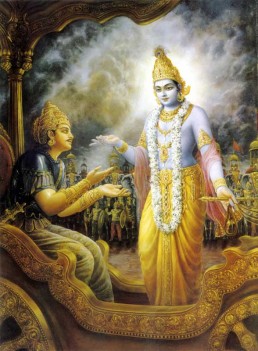Commentary
Surrendering all actions to Me, with the mind intent on the Self, freeing yourself from the longing and selfishness, fight unperturbed by grief.
THIS VERSE IS THE HEART OF THIS CHAPTER CONVEYING ITS CENTRAL THEME. THE LORD REVEALS TO ARJUNA THE DEFINITE DISCIPLINE THAT WOULD LEAD HIM TO HIS HIGHEST GOAL.
Here the word `me’ means not Sri Krishna, the person but the Supreme Self, the Divine Being, the Supreme Lord, the Eternal and the Omniscient, the Self of all. The Lord asks Arjuna to fight on surrendering all activities unto Him, with the mind always concentrated on the Self. Surrendering all actions does not mean inactivity but acting without attachment and the sense of possession with regard to them. Actions performed with egocentric and selfish motives become a bondage. Actions performed without attachment and desires are not actions at all in as much as they are not capable of producing any painful reactions.
It also means giving up of wrong motives behind actions. Purification of motives is possible only when the mind is made to concentrate on the Self and the Divine glory. Actions performed with such mind cannot be ordinary actions but they will be activities performed for the sake of The Lord and are the expressions of the Supreme Will through an individual.
The Lord further advises action without longing, ego and mental perturbance. Longing is an expectation of a happening at a future point of time. Ego is one’s own self-estimation based on his past. To act without ego and longing thus means acting without the memories of the past or the anxieties about the future but to live in the present. Even in the present there is a chance for the man of action to waste his time and energy in unnecessarily worrying about his activities through his inborn nature. This anxiety and worry is what is called here as mental fever or perturbance.
The idea is that we must engage in work by self-surrender to the Lord who presides over cosmic existence and activity. ‘Thy will be done’ should be our attitude in all work. We must do the work with the sense that we are the servants of The Lord. The word `fight’ indicates individual’s confrontation with circumstances and situations in daily life.
RESULT OF SUCH ACTION BASED ON SURRENDERING IT TO THE SUPREME
Swami Chinmayananda
Swami Chinmayananda Commentary
The commentary on this verse and the rest, is avaialble for free as:
Kindle eBook
Google Play Book
Apple Books
Adi Sankara Commentary
Vigata-jvarah, devoid of the fever of the soul, i. e. being free from repentance, without remorse; yuddhyasva, engage in battle; sannyasya, by dedicating; sarvani, all; karmani, actions; mayi, to Me, who am Vasudeva, the omniscient supreme Lord, the Self of all; adhyatma-cetasa, with (your) mind intent on the Self-with discriminating wisdom, with this idea, ‘I am an agent, and I work for God as a servant’; and further, bhutva, becoming; nirasih, free from expectations [‘Free from expectations of results for yourself’]; and nirmamah, free from egoism. You from whom has vanished the idea, ‘(this is) mine’, are nirmamah.
The Bhagavad Gita with the commentary of Sri Sankaracharya – Translated by Alladi Mahadeva Sastry
Holy Geeta – Commentary by Swami Chinmayananda
The Bhagavad Gita by Eknath Easwaran – Best selling translation of the Bhagavad Gita
The Bhagavad Gita – Translation and Commentary by Swami Sivananda
Bhagavad Gita – Translation and Commentary by Bhaktivedanta Swami Prabupadha
Srimad Bhagavad Gita Chapter 3 – Verse 30 – 3.30 mayi sarvani – All Bhagavad Gita (Geeta) Verses in Sanskrit, English, Transliteration, Word Meaning, Translation, Audio, Shankara Bhashya, Adi Sankaracharya Commentary and Links to Videos by Swami Chinmayananda and others – 30-Mar

